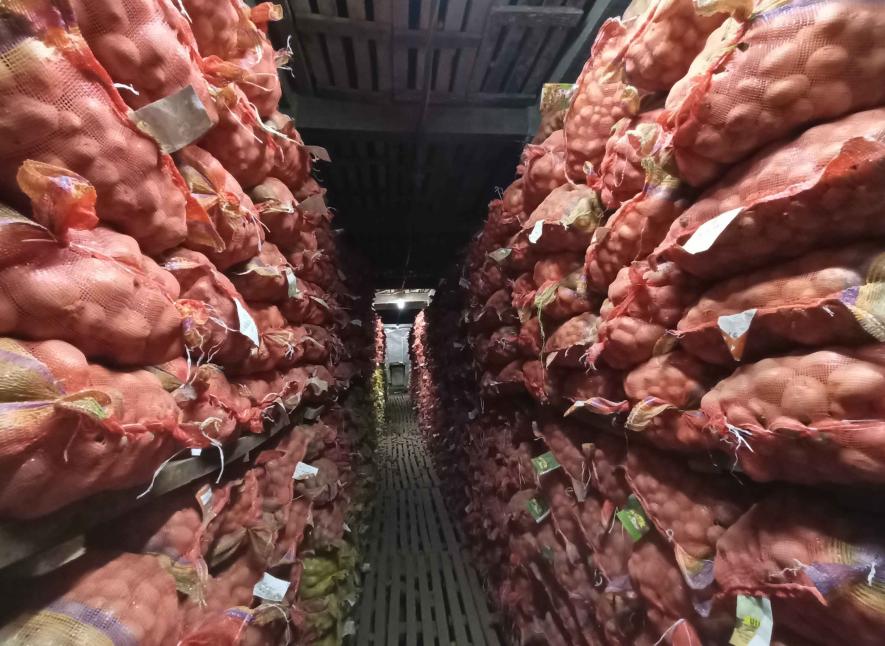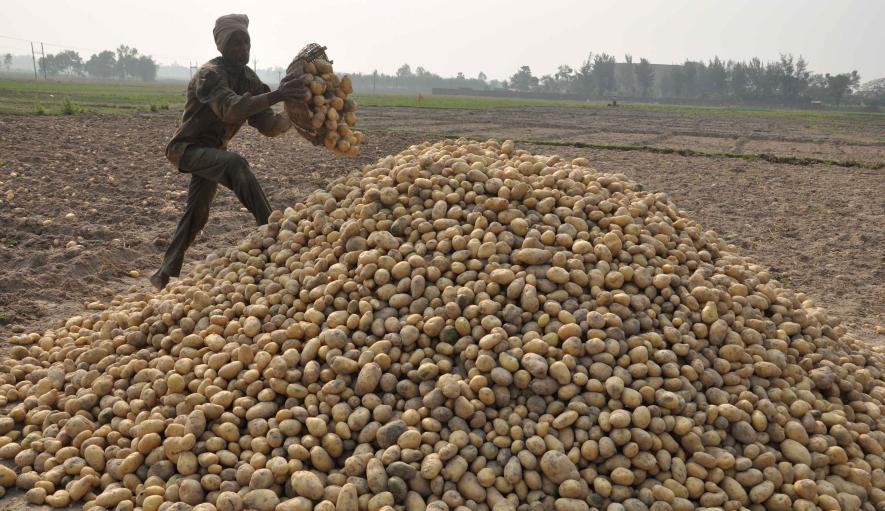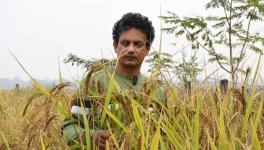Bengal: Potato Farmers in Debt Soup While Middlemen Strike it Rich
Jamuna Ghose and her husband Balaram Ghose of Raibaghini seated on potatoes sacks, wait for the middleman's arrival.
In Raibaghini village in Kotulpur Block in Bankura district of West Bengal, Abhijit Chandra, a marginal farmer, is seated beside sacks brimming with potatoes, waiting under the scorching sun for the arrival of the middleman. Not far away, another farmer, Manik Ghose, is collecting harvested potatoes in one place. Like Chandra, he, too, is eagerly awaiting the middleman's arrival, who will dispatch labourers to fill sacks with potatoes. These potatoes will then be transported to nearby cold storage facilities.
This year, many farmers lack the financial means to package their potatoes and cover transportation costs and storage fees. As a result, they are forced to entrust their hard-earned produce to middlemen, having borrowed money from them, as well as from other moneylenders and microfinance institutions, to finance their cultivation. Regrettably, the cooperative system, once a pillar of support for farmers, lies dormant in Bengal, exacerbating their woes.
Farmers of Shiyakhala under Chandipur 1 Block of Hoogly District picking potato harvest and filling them in sacks. (Image: Madhu Sudan Chatterjee)
A significant number of farmers say they are unable to secure crop loans from cooperatives, which has made them reliant on middlemen, local moneylenders, and fertiliser vendors to cultivate their land. Consequently, potato farmers, once pivotal contributors to Bengal's agricultural output, are gradually losing their autonomy.
This year, the situation has reached critical proportions. The preceding year saw potato farmers endure considerable hardships during the initial stages of planting due to unseasonal rains in early November. Forced to procure seeds and fertilisers at inflated prices from the black market, they grappled with mounting debt amid diminishing crop yields.
Why are Farmers Facing a Dire Situation This Year?
Last year, during the July-August Kharif season, fertiliser prices skyrocketed, and local cooperatives ceased providing fertilisers. Farmers were compelled to purchase them from the black market at exorbitant prices, forcing them to incur high-interest loans.
Cold storage workers wait to unload potato sacks at Kundu cold storage in Bankura. (Image: Madhu Sudan Chatterjee)
"Most cooperatives suspended lending during the cultivation season. Since the Trinamool Congress has come to power in the state, no cooperative has had an elected management committee. Government officials now oversee cooperatives, who lack both an understanding of farmers' current conditions and a direct relationship with them," Tarun Raj, the state leader of the Pashchimbanga Samabai Banchao Committee and secretary of its Bankura district, told this reporter.
"In this difficult situation, we are forced to buy fertilisers and pesticides at inflated prices from shopkeepers and middlemen," Nazrul Aalam Midya and Subash Ghose, farmers from Kamargore village in the Sonamukhi Block of Bankura, told this reporter.
They said their funds had depleted considerably after repaying Kharif cultivation loans. They recounted instances where their paddy had to be sold at low prices to middlemen, unable to benefit from the minimum support price (MSP) offered by government centres. Middlemen have profited from this arrangement, purchasing paddy at low rates (Rs 1,600 per quintal) from farmers and selling it to government centres at Rs 2,260 per quintal.
Following the paddy harvest, farmers turned to potato cultivation. Bengal ranks second in potato cultivation in India, with major production occurring in Purba Bardhaman, Paschim Bardhaman, Pashchim Medinipur, Hoogly, and Bankura districts.
"The weather seemed favourable at the start of cultivation, and farmers hoped for good prices after a high yield last year (2023). However, untimely rains on November 7-8 devastated everything. Acres of potato fields were waterlogged, and all the saplings rotted within days," said Haradhan Kole of Shiyakhala in Chanditala 1 Block of Hoogly, and Madhab Ghose of Memari in Purba Bardhaman.
Farmers like Dilip De from Mainapur in Joypur Block of Bankura, Manoranjan Ghose from Garbeta in Paschim Medinipur, Shekh Khodabox from Madhupur in Hooghly, and Nimai Banerjee from Jamalpur in Purba Bardhaman said they drained stagnant water at additional expenses to resume cultivation. "Why should I leave my ancestral land fallow? Despite the risks, we must restart farming," asserted Sadhan Nayak from Bankadaha in Bishnupur Block, Bankura.
For the first time, farmers purchased seed packets (50 kg) for Rs 1,800-2,000. After the natural disaster, the same quantity of seeds was priced at Rs 5,000 per packet, with compromised quality, plunging farmers into further debt. "We found ourselves in an emotional turmoil, unable to move forward or backward. We had no choice but to resume farming," recounted Santosh Rudra and Jayanta Mallik, farmers from Kotulpur.

Potatoes kept in the chamber at Kundu cold storage in Bankura.
Many farmers across the five districts told this reporter that fertiliser prices also surged during this period. A fertiliser named 10:26:26, with a printed price of Rs 1,800 per sack (50 kg), sold for Rs 5,000 in the black market. Overnight, the price of Di-ammonium phosphate (DAP) also spiked. The cost of pesticide Acrovat Dust 200 grams increased from Rs 900 to Rs 1,600. Farmers said they struggled to afford these essential materials, far beyond their means. During this time, little attention was paid by the state government to the dire consequences being faced by Bengal's potato farmers.
“Affected by natural calamities, the state government failed to support farmers in this dire situation. They received no contact from the agriculture department or the panchayats concerned, and no assistance was announced at the governmental level. Such inhumane behaviour is unimaginable," Amal Haldar, state secretary of Pashchim Banga Pradeshik Krishak Sabha said.
Haldar said potato farmers in Memari, Jamalpur, Kalna, and Rasulpur areas of Purba Bardhaman suffered significantly due to natural disasters and the government's apathy.
Many farmers from these districts reported significantly reduced potato yields after the second planting. Instead of the expected 40-45 quintals per bigha, only 20-25 quintals were produced this year. They claimed that cultivation costs per bigha amounted to Rs 35,000, which is Rs 13,000 higher than last year. Consequently, increased costs and decreased yields have left farmers in dire straits.
Abhijit Nayok, a farmer from Bankadaha, Bishnupur, lamented the absence of the state government's announced "Bangla Shosya Bima" (crop insurance).
Manik Ray, a farmer from Maynapur under Joypur Block, pointed out that although farmers had paid thousands of rupees for insurance, no insurance company had reached out to them. Despite deductions for insurance made by a few cooperatives at the time of loan disbursement, farmers received no insurance payouts in this disaster, he added.
Mohan Chandra De and Ganesh Santra, farmers from Raibhaghini, Kotulpur, also reported receiving no insurance payouts.
An agriculture officer from Bankura, on the condition of anonymity, told this reporter that the potato crop damage was assessed via satellite imagery and reported to the government. He said compensation through Bangla Shosya Bima is only provided if a significant area is damaged, with no provision for individual farmer losses.
Following potato harvesting, most farmers sold their produce immediately to repay debts, as moneylenders continued to pressure them. Additionally, many farmers lacked the financial means to package potatoes for cold storage. Although initial potato prices in the field reached Rs 1,,300-1400 per quintal, these later dropped to Rs 1,100. Despite the higher prices compared with last year, reduced production and increased costs left many farmers selling potatoes at a loss to middlemen to prevent crop spoilage.

Farmer Jadunath Haldar collects his harvest for the middleman at Bankadaha Bishnupur of Bankura district.
Middlemen typically pay farmers nominal amounts for their potatoes and store them in cold storage facilities, despite the potato bond papers being in the farmers' names. Farmers must cover all expenses and interest to retrieve their crops from cold storage, as explained by Jodunath Ray, secretary of Paschim Banga Pradeshik Krishak Sabha, Bankura.
Significantly, the Trinamool Congress-led state government is yet to initiate potato exports from the state. Many farmers fear that potato prices will plummet after cold storage facilities open in May. Will farmers be able to repay middlemen debts and regain control of their potato bonds? Given the current situation, it remains uncertain whether farmers will have the means to do so, potentially leaving middlemen as de facto potato crop owners.
The writer covers the Jangal Mahal region for ‘Ganashakti’ newspaper in West Bengal.
Get the latest reports & analysis with people's perspective on Protests, movements & deep analytical videos, discussions of the current affairs in your Telegram app. Subscribe to NewsClick's Telegram channel & get Real-Time updates on stories, as they get published on our website.
























